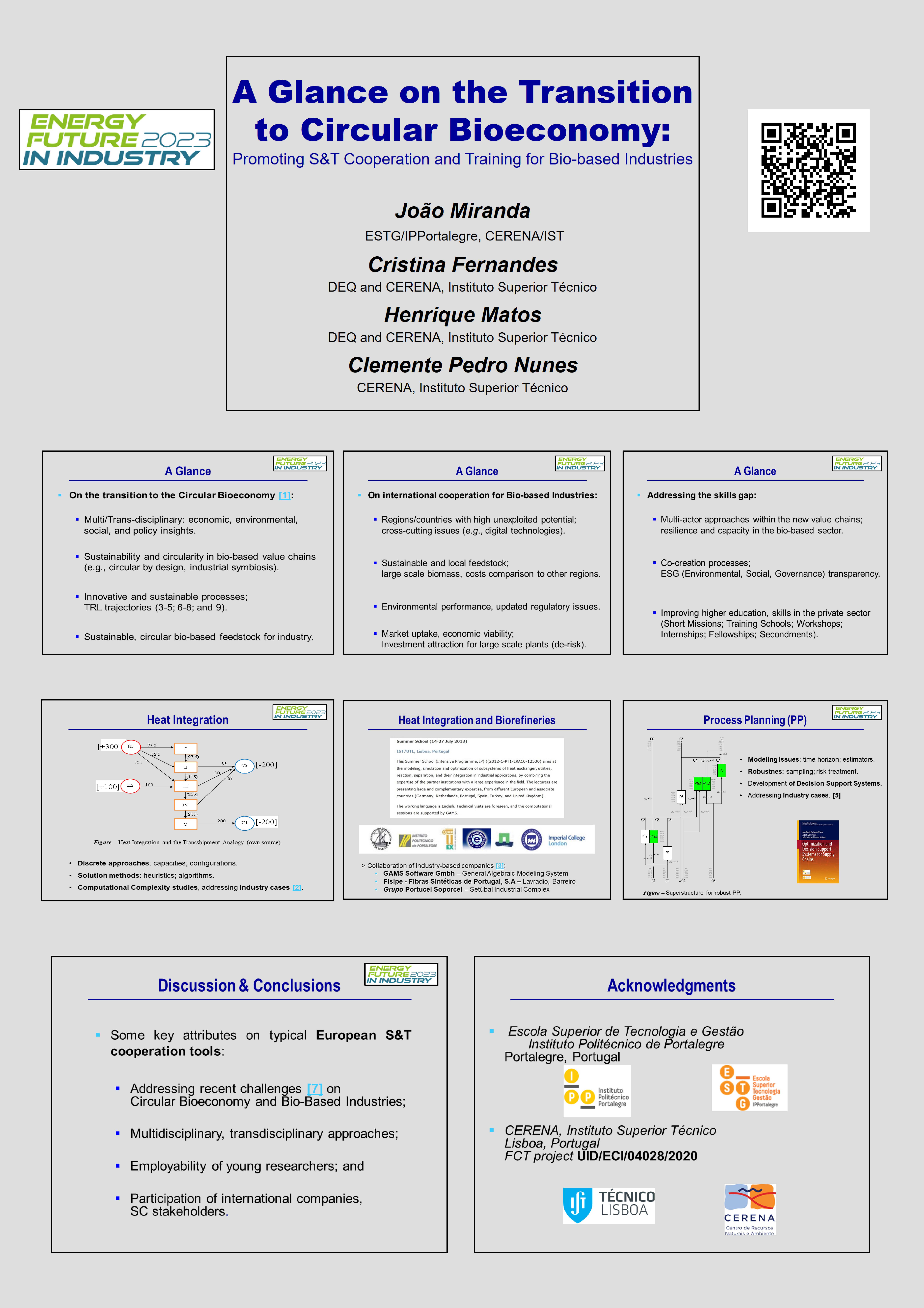A Glance on the Transition to Circular Bioeconomy: Promoting S&T Cooperation and Training for Bio-based Industries
Authors
Miranda(1,3), J.L., Fernandes(2,3), M.C., Matos(2,3), H., Pedro Nunes(3), C.
(1) ESTG, Instituto Politécnico de Portalegre,
Campus Politécnico N10, P7300-555, Portalegre, Portugal
(2) Department of Chemical Engineering, Instituto Superior Técnico
Av.ª Rovisco Pais, 1049-001 Lisboa, Portugal
(3) CERENA-Centro de Recursos Naturais e Ambiente, Instituto Superior Técnico
Av.ª Rovisco Pais, 1049-001 Lisboa, Portugal
Abstract
Important methodologies and tools addressing PSE-Process Systems Engineering, e.g., Artificial Intelligence (AI), Big Data (BD), High Performance Computing (HPC), Machine Learning (ML), Modeling-Simulation-Optimization (MSO), are being integrated in S&T cooperation [1] to further promote competitiveness and sustainability. A convenient glance on the transition to a Circular Bioeconomy, within the large landscape of international Bio-based Industries is presented, namely, cases addressing heat integration [2], biorefineries [3], and training networks [4]. Beyond the S&T projects and networks, the skills gap is also under analysis, being the effectiveness of Higher Education Institutions closely fitting graduates’ employability, thus requiring collaborative research and training experience, namely, through the development and deployment of innovative training actions and multidisciplinary programs [5, 6]. In this way, well prepared staff and young researchers are needed to face the main technological and innovation challenges in the circular bio-based economy [7], thus the related attributes are discussed and future developments outlined.
References
[1] Circular Bio-based Europe Joint Undertaking, A COMPETITIVE BIOECONOMY FOR A SUSTAINABLE FUTURE , Bio-Based Industries Consortium (March-2023). www.cbe.europa.eu
[2] Miranda, J.L., Seita, A., Fernandes, C., Matos, H., Pedro Nunes, C., “Integração e Otimização de Processos na Indústria de Prensados de Madeira”, 315-347 In: Oliveira, R., Soeiro, J. (Edts.), IO em Ação, APDIO-Portuguese Society for Operations Research, IUC-Imprensa da Universidade de Coimbra, Coimbra (December-2014). DOI: http://dx.doi.org/10.14195/978-989-26-0738-2_9
[3] Al-Kassir, A., Fernandes, M.C., Miranda, J.L., Matos, H., Pedro Nunes, C., HIntBioref: An European School in Heat Integration and Biorefineries, Proceedings of IO2013—XVI Congress of APDIO (Bragança Polytechnics Institute, Bragança, Portugal, June-2013), 27.
https://bibliotecadigital.ipb.pt/handle/10198/8452
[4] ReTraCE, Realising the Transition to the Circular Economy: Models, Methods and Applications, https://cordis.europa.eu/project/id/814247
[5] Barbosa-Póvoa, A.P., Corominas, A., Miranda, J.L. (Edts.), Optimization and Decision Support Systems for Supply Chains, “Lectures Notes on Logistics” series, Springer Verlag (September-2016). ISBN: 978-3-319-42421-7; DOI: 10.1007/978-3-319-42421-7
[6] Barbosa-Póvoa, A.P., Jenzer, H., Miranda, J.L. (Edts.), Pharmaceutical Supply Chains – Medicines Shortages, series “Lectures Notes on Logistics”, Springer Verlag (June-2019). ISBN 978-3-030-15398-4; DOI: 10.1007/978-3-030-15398-4
[7] Circular Bio-based Europe Joint Undertaking, Strategic Research and Innovation Agenda , Bio-Based Industries Consortium (June-2022). www.cbe.europa.eu

